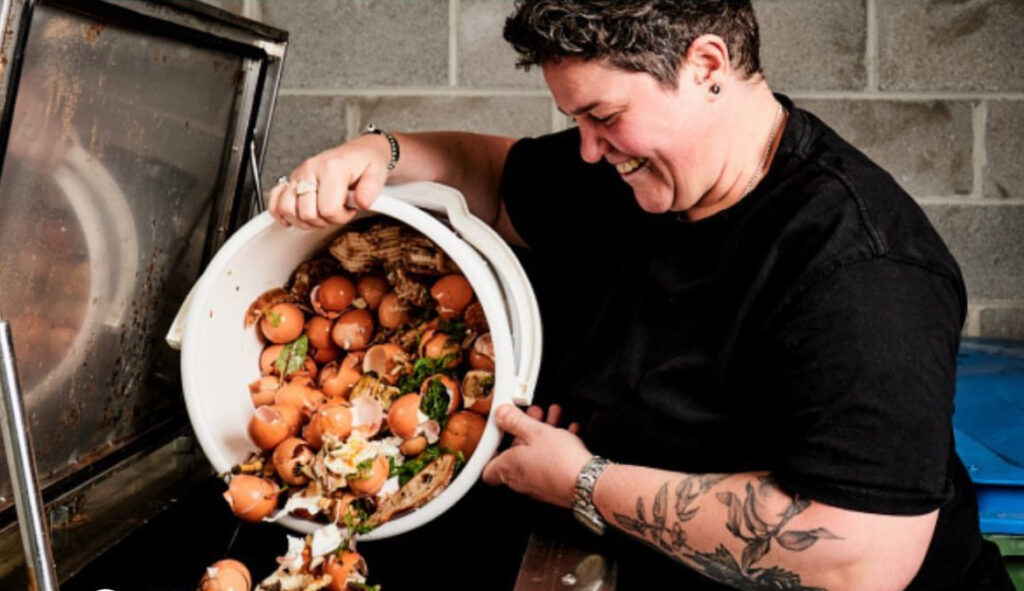In the vibrant and bustling streets of Rio de Janeiro, a revolutionary food movement is taking shape, spearheaded by an inspiring individual, Regina Tchelly. At just 19, Tchelly embarked on a journey from her quaint hometown in northeast Brazil to Rio, fueled by aspirations of culinary fame. However, upon witnessing the rampant waste of perfectly good food by street vendors, her ambitions took a drastic turn.
This observation ignited a profound realization in Tchelly about the pressing issue of food waste and its ramifications. Driven by the values instilled in her during her upbringing—where wasting food was akin to a sin—Tchelly started rescuing discarded ingredients and transforming them into culinary delights. Her innovative creations, such as banana peel gingerbread and broccoli stalk quiche, were not just meals but a bold statement against food wastage.
This transformative experience led to the inception of Favela Orgânica, a groundbreaking initiative that aims to educate and empower the community on sustainable food practices. Through Tchelly’s vision and dedication, the organization has become a beacon of hope, teaching thousands the importance of minimizing food waste, thereby addressing hunger and mitigating environmental damage.
At 42, Tchelly’s message is clear and resonant: “There should be no such thing as throwing away. We’re discarding our planet along with our food. It’s time for a paradigm shift in our behavior. We’re facing a climate crisis, and through our initiative, individuals learn that sustainable eating habits can significantly benefit both their health and our Earth.”
This movement in Brazil is part of a global awakening towards the critical issue of food waste. According to the United Nations Environment Programme’s (UNEP) Food Waste Index Report 2024, over 1 billion meals are wasted every day worldwide, even as approximately 783 million people grapple with hunger. Food waste contributes to 8 to 10 percent of global greenhouse gas emissions, a startling figure that underscores the urgency of addressing this issue.
Brazil, with its massive population, is on the frontline of this battle, producing an alarming 20 million tonnes of food waste annually. With nearly 27 million Brazilians facing food insecurity, the nation is rallying from the grassroots to the governmental level to turn the tide against waste.
“Reducing food waste is critical not only to combat food insecurity but also to address the triple planetary crisis of climate change, biodiversity loss, and pollution,” states Ruth Zugman do Coutto, UNEP’s Climate Change Mitigation Branch Chief. Given the projection that urban areas will account for 80 percent of food consumption by 2050, it’s crucial for municipal authorities to take definitive action. Urban areas have the potential to become hubs for food redistribution, upcycling, and recycling, thereby playing a pivotal role in this fight.”
In response to this challenge, Brazil took a significant step in 2010 by establishing a national policy on solid waste, urging municipalities to adopt composting systems. Despite this progress, the policy lacked specific measures for food waste prevention. This gap has prompted a collaboration between UNEP, nonprofit organizations, and city leaders to draft a comprehensive national policy on food waste reduction and composting, slated for implementation by early 2025. This new policy aims to guide municipalities across the country in their efforts to cut food waste and promote composting initiatives.
Parallel to policy reform, Brazil is crafting its inaugural national strategy on the circular economy, with an emphasis on overhauling food systems to minimize waste at every stage, from production to consumption.
“We realized the need for a more cohesive federal strategy to spotlight this issue,” explains Adalberto Maluf, Brazil’s National Secretary for Urban Environment and Environmental Quality. Without tangible actions, the goal of eradicating hunger continues to be an elusive aspiration.
The government’s efforts are supported by collaborations with entities like the Brazilian Agricultural Research Corporation (Embrapa), which plays a crucial role in this endeavor. Gustavo Porpino of Embrapa, a contributor to the UNEP Food Waste Index Report, highlights the multifaceted benefits of reducing food waste, including economic, social, and environmental impacts.
With Brazil poised to host significant global summits, including this year’s G20 Summit and next year’s UN Climate Change Conference (COP30), the country is determined to place the issue of food waste within the broader discourse on the circular economy and poverty reduction.
Community initiatives like Favela Orgânica exemplify the critical role of grassroots movements in complementing government actions. Tchelly’s organization has become a model of community engagement, offering workshops on alternative gastronomy, home composting, and urban gardening. These initiatives not only foster a culture of sustainability but also empower individuals to make meaningful changes in their relationship with food.
Under Tchelly’s leadership, Favela Orgânica is currently training 160 women in Rio’s favelas on urban gardening and sustainable food practices, emphasizing the importance of a lifecycle approach to ensure that leftovers are reintegrated into the food chain.
This holistic and inclusive approach to tackling food waste in Brazil serves as a blueprint for other nations grappling with similar issues. Through policy reform, community engagement, and innovative solutions like those pioneered by Regina Tchelly and Favela Orgânica, the fight against food waste is gaining momentum, promising a more sustainable and equitable future for all.

